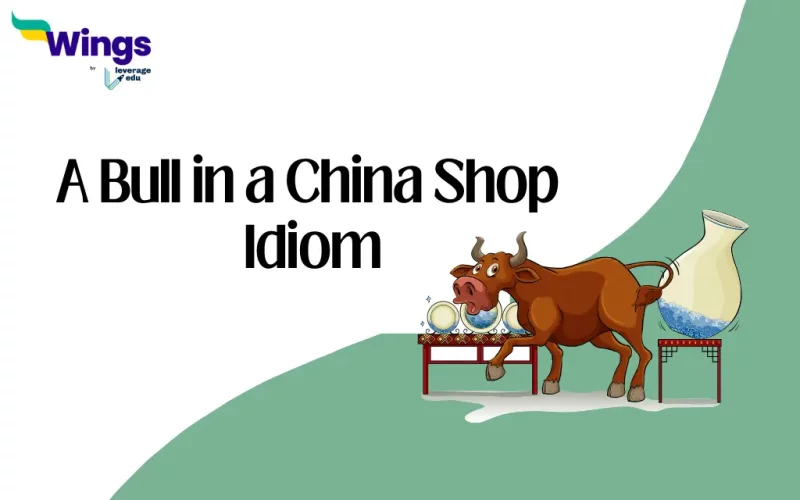The idiom “a bull in a china shop” in the world of English Grammar describes a person who is clumsy or tactless in a situation that requires careful handling. The imagery evokes the chaos that would happen if a bull were to enter a shop filled with fragile china, highlighting the potential for damage and disorder. The phrase is commonly understood to mean a person who breaks things or makes mistakes in delicate situations, or someone who acts inconsiderately or tactlessly, often causing upset or offence. In this blog, you will learn more about a bull in a china shop idiom, its usage and how you can implement it in your day-to-day life.
This Blog Includes:
Also Read: Best Idioms with Examples and Meanings
Origin of “A Bull in a China Shop” Idiom
Here is the brief origin story of ‘a bull in a china shop’ and how the idiom’s usage has come about in today’s age.

Usage With Examples
The phrase is often used with the words “like a” to make the comparison more direct, such as “behaving like a bull in a china shop.” It effectively conveys the idea of someone who causes damage or disruption in sensitive situations due to their lack of care or skill. Here are some examples of how to use this phrase:
- “As a politician, he was a bull in a china shop and often had to apologise for his rough speech.”
- “In confrontational situations, I am like a bull in a china shop.”
Also Read: 29+ Idioms for Cooking To Use in English Writing
A Bull in a China Shop Idiom Example Sentences
Let us explore some example sentences to better understand how the “bull in a China shop” idiom is used in everyday language.
- You need not act like a bull in a china shop. There are better ways to resolve this.
- He is like a bull in a china shop, always knocking things over.
- Politically, he often behaved like a bull in a china shop, upsetting allies with his blunt remarks.
- The new housemaid is a bull in a china shop, breaking dishes left and right.
- You cannot approach this delicate negotiation like a bull in a china shop.
- During the family gathering, he was a bull in a china shop, making everyone uncomfortable with his loud jokes.
- She went into the meeting like a bull in a china shop, ignoring all the unspoken rules.
- That toddler is like a bull in a china shop, running around and causing chaos.
- When he tried to fix the computer, he was a bull in a china shop, making the situation worse.
- You need to calm down; you are acting like a bull in a china shop in this quiet library.
- At the art gallery, he moved around like a bull in a china shop, nearly knocking over several sculptures.
Also Read: Idioms for Amazing to Unlock the Power of Language
11 Synonyms For A Bull in a China Shop Idioms
After understanding the meaning and examples of the idiom, here are synonyms which convey the idea of causing forced damage or chaos.
- Stumbler
- Bumbler
- Lummox
- Clod
- Fumbler
- Butterfingers
- Klutz
- Bungler
- Clumsy
Also Read: Benefit of Doubt Idiom Meaning, Examples, Synonyms
A Bull in a China Shop Quiz
Instruction: Pick the correct answer from the option given below:
Question 1: What does the idiom “a bull in a china shop” mean?
a) Someone who is very careful and delicate.
b) Someone who behaves in a clumsy or disruptive manner.
c) Someone who is very strong and powerful.
d) Someone who works in a china shop.
Answer: b) Someone who behaves in a clumsy or disruptive manner.
Question 2: Which of the following situations best illustrates “a bull in a china shop”?
a) A ballerina performing a graceful dance.
b) A librarian quietly arranging books on a shelf.
c) A child running around and knocking over items in a store.
d) A chef carefully preparing a delicate dish.
Answer: c) A child running around and knocking over items in a store.
Read more related blogs on Idioms
FAQs
An idiom can reveal more about a character’s personality when used in dialogue, like someone saying “kicked the bucket” instead of “died.” It also helps to express complex ideas more simply. For instance, saying “he gave her the cold shoulder” can effectively describe someone being unfriendly without needing lengthy explanations.
The phrase is believed to have originated in the 17th century, reflecting real-life scenarios where cattle would accidentally wander into china shops, causing chaos and destruction. The earliest recorded use of the phrase was in Frederick Marryat’s novel Jacob Faithful, published in 1834.
The phrase originates from imagining a bull inside a shop full of fragile china items. In such a scenario, the bull’s movements would likely cause significant damage to the delicate objects.
This was all about the A Bull in a China Shop idiom. You can also follow the Learn English page of Leverage Edu for more exciting and informative blogs related to English grammar and the English language.
 One app for all your study abroad needs
One app for all your study abroad needs














 45,000+ students realised their study abroad dream with us. Take the first step today.
45,000+ students realised their study abroad dream with us. Take the first step today.

